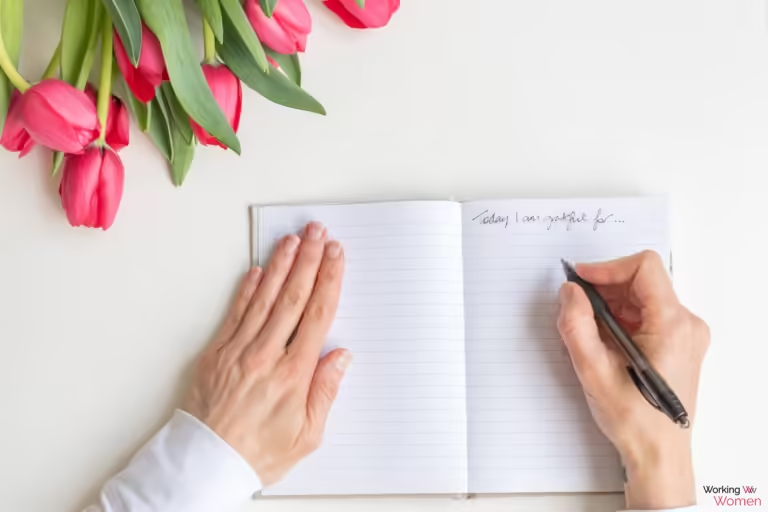Journaling 101: A Beginner’s Guide to less Stressful and more Productive
Life can be overwhelming. We all have those days where our thoughts and feelings get too tangled up to handle. Writing a journal gives you a safe space where you can completely honest with yourself. A place for your worries, dreams, goals, and every messy thought in between. That’s the power of journaling. It’s your private world to explore and make sense of things.
Table of Contents
What is Journaling?
Writing a journal isn’t a magic solution, but it’s a tool that can help you understand yourself better. It can be your key to unlocking more calm, clarity, and maybe even a few hidden strengths you didn’t know you had.
journaling meaning
Journaling means writing down your thoughts and feelings as you move through ups and downs of life. It’s a powerful tool for processing emotions, especially during times of anxiety or sadness, and can lead to self-discovery, self-awareness and personal growth
Journaling Types
Writing a Journal is a deeply personal practice. As we all are different. There’s no one size-fits all approach to write a journal. Do you want to analyze your thoughts and feelings? Track your daily routine? Think about why you want to journal? Understanding what you want to get out of journal will help you choose the type that’s right for you.
Simple Notebooks
Think of the classic diary, where you can record your days. It is best to dump your emotions, capture life experiences and reflect on life’s ups and downs in a unstructured and personal way.
Structure Bullet Journaling
The bullet journal (or BuJo) is a super adaptable system. Using simple symbols, you create a personalized mix of to-do lists, trackers, goal planning, and reflection space. It’s great for those who like a structured yet creative approach to journal.
gratitude journaling
This type of journal is all about shifting your focus to the good. Here you log all the things you’re grateful for, big or small. This promotes a positive mindset and helps cultivate an appreciation for the blessings in your life. Studies revealed gratitude linked to happiness.
App-based Journals
These digital journals bring convenience and accessibility to your fingertips. Many offer features like password protection, customizable templates, prompts, and the ability to add photos or audio recordings. App-based journals are great for those who prefer technology and want to keep their journal with them wherever they go.
Goal Setting Journals
These journals are your partners in achieving your dreams. They provide structured space to define your goals (big or small), break them down into actionable steps, and track your progress along the way. Goal-setting journals help you stay motivated, accountable, and celebrate your wins.
Techniques for Journaling
The way we journal doesn’t have to be complicated. The best technique is the one that works for you. Let’s find some simple yet effective techniques to get you started.
Freewriting: Writing without stopping or editing, letting your thoughts flow freely
Morning Pages: Three pages of stream-of-consciousness writing done first thing in the morning.
Prompts for Exploration: Using questions to guide your writing, like “What am I struggling with today?” or “What would my ideal day look like?”
Unsent Letters: Writing a letter to someone (or even yourself) that you won’t actually send, allowing for raw expression.
Art Journals: Incorporating drawing, sketching, or collage to express yourself visually alongside writing.
What to write in a Journal?
Your journal is a dynamic tool (means you can evolve it over time or your mood). You might start writing a journal to figure out your ideal career path, then later use it to strategize how to reach your goals. Here’s a list to spark inspiration, experiment and discover which topics resonate with you:
- Goals (personal and professional)
- Gratitude lists
- Inspiring quotes
- Personal reflections and insights
- Questions to ponder for later reflection
- Areas you’d like to improve
- Self-affirmations
- Long-term dreams and visions
- Documenting your daily life and experiences
- Challenges you face and how to overcome them
- Food tracking in connection with how you feel
I hope this video also helps you to get clarity.
Journaling Benefits
Are you curious about how journal writing can improve your well-being? Here we mentioned some of the benefits, it can bring to your mind, body, and spirit.
Mental and Emotional Benefits
Writing a journal is a powerful tool for mental and emotional well-being. It acts as an outlet to vent frustrations, reducing stress and tension. The act of writing helps you process complex emotions, leading to greater understanding and healing. Recent studies revealed a direct corelation in writing journal and mental wellbeing.
Focusing on gratitude and positivity in your journal can significantly boost your mood and overall happiness. Another study suggests that even in the time of pandemic gratitude writings significantly help in stress and anxiety reduction.
Over time, writing journals promotes self-awareness by revealing your thought patterns, behaviors, and the values that are most important to you. It can also be incredibly supportive when used alongside therapy for managing mental health conditions like anxiety and depression.
Cognitive Benefits
Writing a journal isn’t just about emotions, it sharpens your mind too! By writing down events and thoughts, you boost your memory recall. The act of putting your problems on paper brings clarity, making it easier to find solutions and make informed decisions. In a recent article, brain expert Jim Kwik outlines 7 benefits of writing a journal for brain health.
This habit also unleashes your creativity through freewriting and idea exploration. Plus, it’s a fantastic tool for setting goals, breaking them down into steps, and proudly tracking your progress along the way.
Physical Benefits
You might be surprised to learn that journaling can have positive effects on your physical health! Because writing a journal improves mental well-being, it has a ripple effect on your body.
Journal writing doesn’t just improve long-term health, it can even accelerate healing! One study found that expressive writing helped older adults heal wounds faster. Other studies suggest it can boost your immune system, making you less likely to get sick. It can also reduce stress symptoms like high blood pressure and poor sleep. Additionally, some research indicates journal writing may even help manage chronic pain conditions.
Writing about stressful experiences for 15 minutes a day can have physical health benefits. A 2018 Cambridge study revealed participants experienced fewer doctor’s visits and sick days after writing journal for four months.
Conclusion
From stress relief to achieving goals, the benefits of journal writing are undeniable. It’s a simple yet transformative tool, accessible to anyone. Give yourself the gift of journaling and experience the positive changes it can bring to your life. Imagine the person you could become by dedicating just a few minutes each day to exploring your inner world. The possibilities are endless.
They pages of your journal hold the potential for self-discovery, growth, and a happier, more fulfilled life. What will your first entry say? It is not a one-time magic tool instead make it a habit even by starting to write at least 3 lines each day. But do it daily and see your life transform.
FAQs
To start journaling for mental health, choose a format that appeals to you (notebook, digital, or a mix). Find a quiet space and start with short 5-10 minute sessions. Remember, there are no rules – write freely, try prompts for guidance, or simply focus on your feelings. The key is consistency. Journaling can help you gain self-awareness, understand your emotions, and support your overall mental well-being.
While both journal writing and keeping a diary involve writing, they have subtle differences in focus and use. A traditional diary often serves as a daily log, focusing on recording events, thoughts, and feelings as they happen. Journal writing, on the other hand, is more open-ended and exploratory. It can include elements of a diary, but also offers space for goal setting, problem-solving, self-reflection, and expressing emotions with broader themes in mind.
To start writing a journal as a beginner, find a simple notebook or try a journal app. Choose a quiet spot and set a timer for 5-10 minutes. Let go of expectations for perfect writing and simply start! Experiment with freewriting (letting your thoughts flow freely), using prompts to guide you, or simply writing about your day. The most important thing is to start and make writing journal a regular habit, even if it’s just for short bursts of time.
Journaling art, is a creative and expressive way to combine traditional journal writing with visual elements. It’s about using your journal as a canvas for self-expression, where you can add drawings, paintings, collages, mixed media, and anything that inspires you. Art journals doesn’t require artistic skill, it’s about the process of creation, exploring emotions, and adding a visual layer to your thoughts and feelings.
Writing a Journal is therapeutic for several reasons. It provides a safe space to express emotions without judgment, helping you process difficult experiences and gain clarity. The act of writing can be soothing, reducing stress and promoting mindfulness. Journal writing encourages self-reflection, leading to better self-understanding and identification of patterns. It can also boost problem-solving skills and creativity by giving your thoughts room to breathe and new connections to form.
Junk journaling is a form of creative expression where you transform a journal (often handmade) using a variety of recycled and found materials. Think old book pages, maps, stamps, tickets, fabric scraps, vintage paper, and other bits and bobs that might otherwise be discarded.
Junk journals are often mixed-media creations, incorporating writing, drawing, collage, and even pockets or envelopes for tucking away mementos. It’s a fun and unique way to express yourself, preserve memories, and create a beautiful, personalized art piece.




